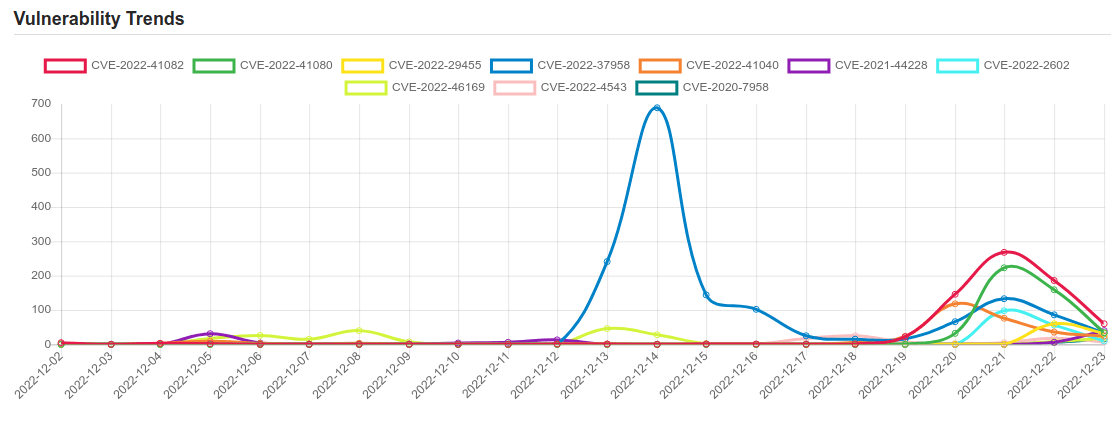Daily Vulnerability Trends: Sat Dec 24 2022

| CVE NAME | CVE Description |
| CVE-2022-46169 | Cacti is an open source platform which provides a robust and extensible operational monitoring and fault management framework for users. In affected versions a command injection vulnerability allows an unauthenticated user to execute arbitrary code on a server running Cacti, if a specific data source was selected for any monitored device. The vulnerability resides in the `remote_agent.php` file. This file can be accessed without authentication. This function retrieves the IP address of the client via `get_client_addr` and resolves this IP address to the corresponding hostname via `gethostbyaddr`. After this, it is verified that an entry within the `poller` table exists, where the hostname corresponds to the resolved hostname. If such an entry was found, the function returns `true` and the client is authorized. This authorization can be bypassed due to the implementation of the `get_client_addr` function. The function is defined in the file `lib/functions.php` and checks serval `$_SERVER` variables to determine the IP address of the client. The variables beginning with `HTTP_` can be arbitrarily set by an attacker. Since there is a default entry in the `poller` table with the hostname of the server running Cacti, an attacker can bypass the authentication e.g. by providing the header `Forwarded-For: |
| CVE-2022-4543 | No description provided |
| CVE-2020-7958 | An issue was discovered on OnePlus 7 Pro devices before 10.0.3.GM21BA. The firmware was found to contain functionality that allows a privileged user (root) in the Rich Execution Environment (REE) to obtain bitmap images from the fingerprint sensor because of Leftover Debug Code. The issue is that the Trusted Application (TA) supports an extended number of commands beyond what is needed to implement a fingerprint authentication system compatible with Android. An attacker who is in the position to send commands to the TA (for example, the root user) is able to send a sequence of these commands that will result in the TA sending a raw fingerprint image to the REE. This means that the Trusted Execution Environment (TEE) no longer protects identifiable fingerprint data from the REE. |
| CVE-2019-16891 | Liferay Portal CE 6.2.5 allows remote command execution because of deserialization of a JSON payload. |
| CVE-2022-42821 | A logic issue was addressed with improved checks. This issue is fixed in macOS Monterey 12.6.2, macOS Big Sur 11.7.2, macOS Ventura 13. An app may bypass Gatekeeper checks. |
| CVE-2021-1732 | Windows Win32k Elevation of Privilege Vulnerability This CVE ID is unique from CVE-2021-1698. |
| CVE-2022-46689 | A race condition was addressed with additional validation. This issue is fixed in tvOS 16.2, macOS Monterey 12.6.2, macOS Ventura 13.1, macOS Big Sur 11.7.2, iOS 15.7.2 and iPadOS 15.7.2, iOS 16.2 and iPadOS 16.2, watchOS 9.2. An app may be able to execute arbitrary code with kernel privileges. |
| CVE-2022-47942 | An issue was discovered in ksmbd in the Linux kernel before 5.19.2. There is a heap-based buffer overflow in set_ntacl_dacl, related to use of SMB2_QUERY_INFO_HE after a malformed SMB2_SET_INFO_HE command. |
| CVE-2022-22583 | A permissions issue was addressed with improved validation. This issue is fixed in Security Update 2022-001 Catalina, macOS Monterey 12.2, macOS Big Sur 11.6.3. An application may be able to access restricted files. |
| CVE-2022-42475 | No description provided |
| CVE-2022-47633 | An image signature validation bypass vulnerability in Kyverno 1.8.3 and 1.8.4 allows a malicious image registry (or a man-in-the-middle attacker) to inject unsigned arbitrary container images into a protected Kubernetes cluster. This is fixed in 1.8.5. This has been fixed in 1.8.5 and mitigations are available for impacted releases. |
| CVE-2022-47520 | An issue was discovered in the Linux kernel before 6.0.11. Missing offset validation in drivers/net/wireless/microchip/wilc1000/hif.c in the WILC1000 wireless driver can trigger an out-of-bounds read when parsing a Robust Security Network (RSN) information element from a Netlink packet. |
| CVE-2022-32250 | net/netfilter/nf_tables_api.c in the Linux kernel through 5.18.1 allows a local user (able to create user/net namespaces) to escalate privileges to root because an incorrect NFT_STATEFUL_EXPR check leads to a use-after-free. |
| CVE-2022-41082 | Microsoft Exchange Server Remote Code Execution Vulnerability. |
| CVE-2022-41080 | Microsoft Exchange Server Elevation of Privilege Vulnerability. This CVE ID is unique from CVE-2022-41123. |
|
A considerable amount of time and effort goes into maintaining this website, creating backend automation and creating new features and content for you to make actionable intelligence decisions. Everyone that supports the site helps enable new functionality.  To keep up to date follow us on the below channels.     
|


![[Palo Alto Networks Security Advisories] CVE-2023-48795 Impact of Terrapin SSH Attack 8 Palo_Alto_Networks_Logo](https://www.redpacketsecurity.com/wp-content/uploads/2025/02/Palo_Alto_Networks_Logo-300x55.png)
![[QILIN] - Ransomware Victim: WH Rogers Sheet Metal 9 image](https://www.redpacketsecurity.com/wp-content/uploads/2024/09/image-300x300.png)
